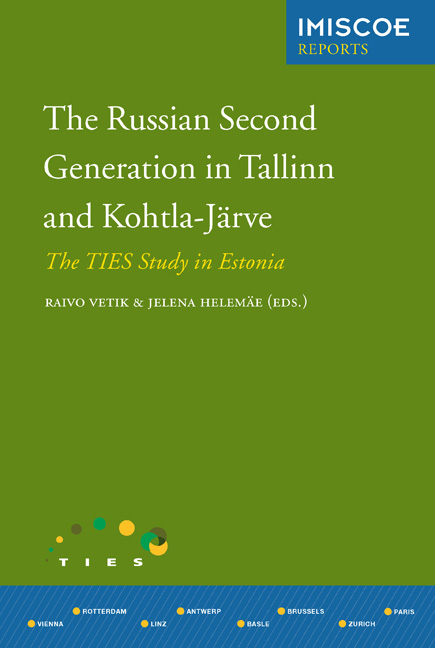Book contents
- Fronmatter
- Contents
- Preface
- List of Tables, Figures and Chapter Appendices
- 1 Introduction
- 2 Migration Patterns
- 3 Integration Policies
- 4 Ethnic Inequalities in Education
- 5 Explaining Different Returns from Human Capital in the labour Market
- 6 Income Inequality
- 7 Housing Conditions Andneighbourhood Satisfaction
- 8 Contact and Crisis in Interethnic Relations
- 9 Gender role Attitudes
- 10 Sense of Belonging to Estonia
- 11 Conclusions
- Appendix
- List of Contributors
- Other IMISCOE Titles
9 - Gender role Attitudes
Published online by Cambridge University Press: 20 January 2021
- Fronmatter
- Contents
- Preface
- List of Tables, Figures and Chapter Appendices
- 1 Introduction
- 2 Migration Patterns
- 3 Integration Policies
- 4 Ethnic Inequalities in Education
- 5 Explaining Different Returns from Human Capital in the labour Market
- 6 Income Inequality
- 7 Housing Conditions Andneighbourhood Satisfaction
- 8 Contact and Crisis in Interethnic Relations
- 9 Gender role Attitudes
- 10 Sense of Belonging to Estonia
- 11 Conclusions
- Appendix
- List of Contributors
- Other IMISCOE Titles
Summary
Introduction
The studies on gender-related social processes have pointed to an inequality in the distribution of resources and opportunities between men and women, both in the Western and in Eastern European countries (Hanson & Wells-Dang 2006). On the one hand, opportunities and choices for men and women depend on the gender ideology and labour market policies of the country. On the other hand, they also depend on prevailing currents in the gender role attitudes of the society and in the individual's attitudes (Barber & Axinn 1998). The studies carried out in Estonia in the last decade, for instance the Gender Equality Monitoring carried out in 2005 (Soolise võrdõiguslikkuse … 2005), have shown that two ethnic and linguistic groups – Russian speakers with an immigrant background and native Estonians – held somewhat different attitudes towards gender roles. In many aspects, the gender role attitudes of Russians seem to be more traditional than the attitudes of native Estonians. However, to date there has been no systematic analysis of whether second-generation immigrants share the attitudes of their parents’ generation, or to what extent support for more traditional gender roles come from structural or cultural factors.
A number of studies, which have analysed the changes in gender role attitudes in Western countries, have revealed that along with a rapid increase of female employment, the gender systems have also changed and the traditional male breadwinner family model of the 1950s has been replaced by a model of gender equality (Hirdman 1991). Accordingly, in these countries the gender role attitudes are also changing, the changes being most noticeable in the Nordic countries (Grönroos & Lorenzen 2003; Lück 2005). Compared to Western countries, the former socialist countries have followed a different path in terms of gender issues. In the Soviet period, these countries were characterised by a discrepancy between the official gender ideology and the everyday gendered practices. In practical terms, it meant that full female employment coexisted with traditional gender roles and unequal division of household tasks in the domestic sphere. Furthermore, while in Western countries the 1990s were characterised by an increasing support of egalitarian gender roles, in the post-socialist countries, the political and economic reforms of the 1990s evoke a shift towards more traditional attitudes (Narusk & Kandolin 1997; Rotkirch & Temkina 1997; Motiejunaite 2005).
- Type
- Chapter
- Information
- The Russian Second Generation in Tallinn and Kohtla-JärveThe TIES Study in Estonia, pp. 183 - 202Publisher: Amsterdam University PressPrint publication year: 2012



